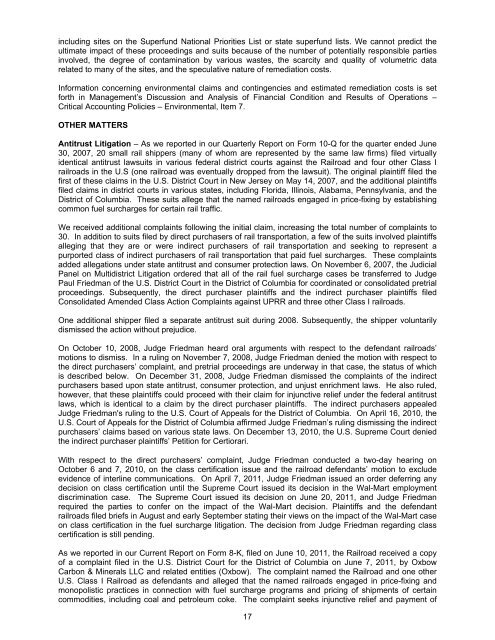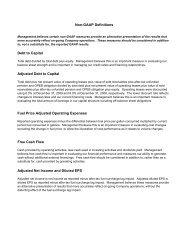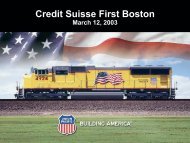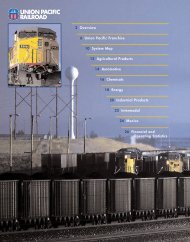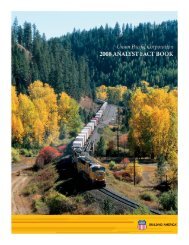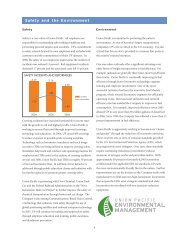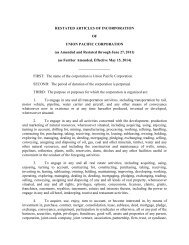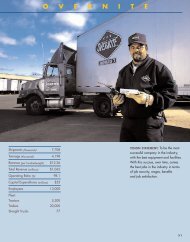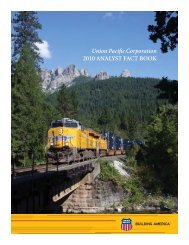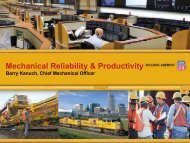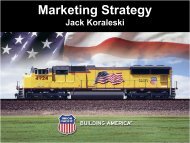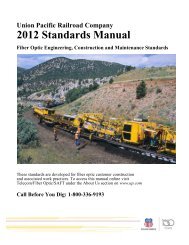Form 10-K - Union Pacific
Form 10-K - Union Pacific
Form 10-K - Union Pacific
Create successful ePaper yourself
Turn your PDF publications into a flip-book with our unique Google optimized e-Paper software.
including sites on the Superfund National Priorities List or state superfund lists. We cannot predict the<br />
ultimate impact of these proceedings and suits because of the number of potentially responsible parties<br />
involved, the degree of contamination by various wastes, the scarcity and quality of volumetric data<br />
related to many of the sites, and the speculative nature of remediation costs.<br />
Information concerning environmental claims and contingencies and estimated remediation costs is set<br />
forth in Management’s Discussion and Analysis of Financial Condition and Results of Operations –<br />
Critical Accounting Policies – Environmental, Item 7.<br />
OTHER MATTERS<br />
Antitrust Litigation – As we reported in our Quarterly Report on <strong>Form</strong> <strong>10</strong>-Q for the quarter ended June<br />
30, 2007, 20 small rail shippers (many of whom are represented by the same law firms) filed virtually<br />
identical antitrust lawsuits in various federal district courts against the Railroad and four other Class I<br />
railroads in the U.S (one railroad was eventually dropped from the lawsuit). The original plaintiff filed the<br />
first of these claims in the U.S. District Court in New Jersey on May 14, 2007, and the additional plaintiffs<br />
filed claims in district courts in various states, including Florida, Illinois, Alabama, Pennsylvania, and the<br />
District of Columbia. These suits allege that the named railroads engaged in price-fixing by establishing<br />
common fuel surcharges for certain rail traffic.<br />
We received additional complaints following the initial claim, increasing the total number of complaints to<br />
30. In addition to suits filed by direct purchasers of rail transportation, a few of the suits involved plaintiffs<br />
alleging that they are or were indirect purchasers of rail transportation and seeking to represent a<br />
purported class of indirect purchasers of rail transportation that paid fuel surcharges. These complaints<br />
added allegations under state antitrust and consumer protection laws. On November 6, 2007, the Judicial<br />
Panel on Multidistrict Litigation ordered that all of the rail fuel surcharge cases be transferred to Judge<br />
Paul Friedman of the U.S. District Court in the District of Columbia for coordinated or consolidated pretrial<br />
proceedings. Subsequently, the direct purchaser plaintiffs and the indirect purchaser plaintiffs filed<br />
Consolidated Amended Class Action Complaints against UPRR and three other Class I railroads.<br />
One additional shipper filed a separate antitrust suit during 2008. Subsequently, the shipper voluntarily<br />
dismissed the action without prejudice.<br />
On October <strong>10</strong>, 2008, Judge Friedman heard oral arguments with respect to the defendant railroads’<br />
motions to dismiss. In a ruling on November 7, 2008, Judge Friedman denied the motion with respect to<br />
the direct purchasers’ complaint, and pretrial proceedings are underway in that case, the status of which<br />
is described below. On December 31, 2008, Judge Friedman dismissed the complaints of the indirect<br />
purchasers based upon state antitrust, consumer protection, and unjust enrichment laws. He also ruled,<br />
however, that these plaintiffs could proceed with their claim for injunctive relief under the federal antitrust<br />
laws, which is identical to a claim by the direct purchaser plaintiffs. The indirect purchasers appealed<br />
Judge Friedman's ruling to the U.S. Court of Appeals for the District of Columbia. On April 16, 20<strong>10</strong>, the<br />
U.S. Court of Appeals for the District of Columbia affirmed Judge Friedman’s ruling dismissing the indirect<br />
purchasers’ claims based on various state laws. On December 13, 20<strong>10</strong>, the U.S. Supreme Court denied<br />
the indirect purchaser plaintiffs’ Petition for Certiorari.<br />
With respect to the direct purchasers’ complaint, Judge Friedman conducted a two-day hearing on<br />
October 6 and 7, 20<strong>10</strong>, on the class certification issue and the railroad defendants’ motion to exclude<br />
evidence of interline communications. On April 7, 2011, Judge Friedman issued an order deferring any<br />
decision on class certification until the Supreme Court issued its decision in the Wal-Mart employment<br />
discrimination case. The Supreme Court issued its decision on June 20, 2011, and Judge Friedman<br />
required the parties to confer on the impact of the Wal-Mart decision. Plaintiffs and the defendant<br />
railroads filed briefs in August and early September stating their views on the impact of the Wal-Mart case<br />
on class certification in the fuel surcharge litigation. The decision from Judge Friedman regarding class<br />
certification is still pending.<br />
As we reported in our Current Report on <strong>Form</strong> 8-K, filed on June <strong>10</strong>, 2011, the Railroad received a copy<br />
of a complaint filed in the U.S. District Court for the District of Columbia on June 7, 2011, by Oxbow<br />
Carbon & Minerals LLC and related entities (Oxbow). The complaint named the Railroad and one other<br />
U.S. Class I Railroad as defendants and alleged that the named railroads engaged in price-fixing and<br />
monopolistic practices in connection with fuel surcharge programs and pricing of shipments of certain<br />
commodities, including coal and petroleum coke. The complaint seeks injunctive relief and payment of<br />
17


